
Al-Qaeda is a pan-Islamist militant organization led by Sunni Jihadists who self-identify as a vanguard spearheading a global Islamist revolution to unite the Muslim world under a supra-national Islamic state known as the Caliphate. Its members are mostly composed of Arabs, but also include people from other ethnic groups. Al-Qaeda has mounted attacks on civilian, economic and military targets of the US and its allies; such as the 1998 US embassy bombings, the USS Cole bombing and the September 11 attacks. The organization is designated as a terrorist group by NATO, UN Security Council, the European Union, and various countries around the world.

Ansar al-Islam in Kurdistan, simply called Ansar al-Islam, is a Kurdish Islamist militant and separatist group. It was established in northern Iraq around the Kurdistan Region by Kurdish Islamists who were former Taliban and former Al-Qaeda volunteers, which were coming back from Afghanistan in 2001 after the Fall of Kabul. Its motive is to establish an Islamic state around the Kurdistan region and to protect Kurdish people from other armed insurgent groups. It imposed strict Sharia in villages it controlled around Byara near the Iranian border.
Criticism of the war on terror addresses the morals, ethics, efficiency, economics, as well as other issues surrounding the war on terror. It also touches upon criticism against the phrase itself, which was branded as a misnomer. The notion of a "war" against "terrorism" has proven highly contentious, with critics charging that participating governments exploited it to pursue long-standing policy/military objectives, reduce civil liberties, and infringe upon human rights. It is argued by critics that the term war is not appropriate in this context, since there is no identifiable enemy and that it is unlikely international terrorism can be brought to an end by military means.
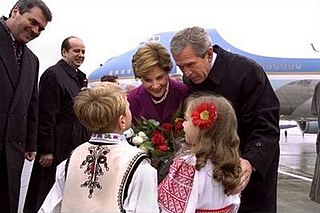
The main event by far shaping the foreign policy of the United States during the presidency of George W. Bush (2001–2009) was the 9/11 terrorist attacks against the United States on September 11, 2001, and the subsequent war on terror. There was massive domestic and international support for destroying the attackers. With UN approval, US and NATO forces quickly invaded the attackers' base in Afghanistan and drove them out and the Taliban government that harbored them. It was the start of a 20-year quagmire that finally ended in failure with the withdrawal of United States troops from Afghanistan.
Michael F. Scheuer, is an American former intelligence officer for the Central Intelligence Agency, blogger, author, commentator and former adjunct professor at Georgetown University's Center for Peace and Security Studies. One assignment during his 22-year career was serving as Chief of the Bin Laden Issue Station from 1996 to 1999. He also served as Special Advisor to the Chief of Alec Station from September 2001 to November 2004.
The Saddam–al-Qaeda conspiracy theory was based on false claims made by the United States government, alleging that a highly secretive relationship existed between Iraqi president Saddam Hussein and the Sunni pan-Islamist militant organization al-Qaeda between 1992 and 2003. The George W. Bush administration promoted it as a main rationale for invading Iraq in 2003.

Stephen Forester Hayes is an American journalist and author. In October 2019 Hayes co-founded the online opinion and news publication The Dispatch. Previously, he was a senior writer for National Journal and Editor-in-chief of The Weekly Standard. He was a staunch proponent of the Iraq War and an influential figure in promoting the claim that the Saddam Hussein regime and Al Qaeda had an operational relationship.

There are various rationales for the Iraq War, both the 2003 invasion of Iraq and the subsequent hostilities. The George W. Bush administration began actively pressing for military intervention in Iraq in late 2001. The primary rationalization for the Iraq War was articulated by a joint resolution of the United States Congress known as the Iraq Resolution. The US claimed the intent was to "disarm Iraq of weapons of mass destruction, to end Saddam Hussein's alleged support for terrorism, and to supposedly free Iraqi people".
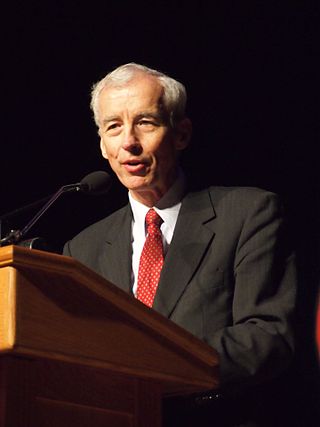
Paul R. Pillar is an academic and 28-year veteran of the Central Intelligence Agency (CIA), serving from 1977 to 2005. He is now a non-resident senior fellow at Georgetown University's Center for Security Studies, as well as a nonresident senior fellow in the Brookings Institution's Center for 21st Century Security and Intelligence. He was a visiting professor at Georgetown University from 2005 to 2012. He is a contributor to The National Interest.
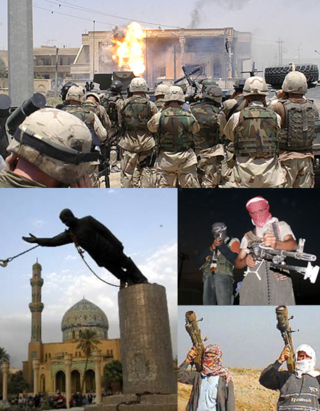
The Iraq War was a protracted armed conflict in Iraq from 2003 to 2011. It began with the invasion of Iraq by the United States-led coalition that overthrew the Ba'athist government of Saddam Hussein. The conflict continued for much of the next decade as an insurgency emerged to oppose the coalition forces and the post-invasion Iraqi government. US troops were officially withdrawn in 2011. The United States became re-involved in 2014 at the head of a new coalition, and the insurgency and many dimensions of the armed conflict are ongoing. The invasion occurred as part of the George W. Bush administration's war on terror following the September 11 attacks.
This article is a chronological listing of allegations of meetings between members of al-Qaeda and members of Saddam Hussein's government, as well as other information relevant to conspiracy theories involving Saddam Hussein and al-Qaeda.
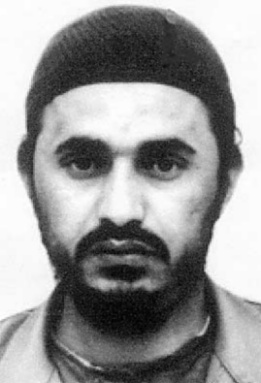
Abu Musab al-Zarqawi, born Ahmad Fadeel al-Nazal al-Khalayleh, was a Jordanian jihadist who ran a terrorist training camp in Afghanistan. He became known after going to Iraq and being responsible for a series of bombings, beheadings, and attacks during the Iraq War, reportedly "turning an insurgency against US troops" in Iraq "into a Shia–Sunni civil war". He was sometimes known by his supporters as the "Sheikh of the slaughterers".
Evan F. Kohlmann is an American terrorism consultant who has worked for the FBI and other governmental organizations.

The war on terror, officially the Global War on Terrorism (GWOT), is a global military campaign initiated by the United States following the September 11 attacks and is the most recent global conflict spanning multiple wars. The main targets of the campaign are militant Islamist movements like Al-Qaeda, Taliban and their allies. Other major targets included the Ba'athist regime in Iraq, which was deposed in an invasion in 2003, and various militant factions that fought during the ensuing insurgency. After its territorial expansion in 2014, the Islamic State militia has also emerged as a key adversary of the United States.

FDD's Long War Journal (LWJ) is an American news website, also described as a blog, which reports on the War on terror. The site is operated by Public Multimedia Incorporated (PMI), a non-profit media organization established in 2007. PMI is run by Paul Hanusz and Bill Roggio. Roggio is the managing editor of the journal and Thomas Joscelyn is senior editor. The site is a project of the Foundation for Defense of Democracies, where both Roggio and Joscelyn are senior fellows.
Pakistan's role in the War on Terror is a widely discussed topic among policy-makers of various countries, political analysts and international delegates around the world. Pakistan has simultaneously received allegations of harbouring and aiding terrorists and commendation for its anti-terror efforts. Since 2001, the country has also hosted millions of Afghan refugees who fled the war in Afghanistan.
The War on Terror is the campaign launched by the United States of America in response to the September 11 attacks against organizations designated with terrorism. The campaign, whose stated objective was eliminating international terrorism, began in 2001. The following is a timeline of events linked to the War on Terror.
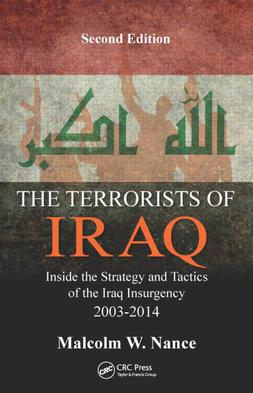
The Terrorists of Iraq: Inside the Strategy and Tactics of the Iraq Insurgency 2003–2014 is a nonfiction book about the Iraqi insurgency, written by U.S. Navy retired cryptology analyst Malcolm Nance. It was published by CRC Press in 2014. The book discusses the terrorist evolution of the Iraqi insurgency which led to the formation of Islamic State of Iraq and the Levant (ISIS). Nance cites the 2003 Iraq war by the Bush Administration for causing regional instability. He criticizes Coalition Provisional Authority leader Paul Bremer. The book emphasizes lessons the U.S. neglected to learn from the Vietnam War, the Iraqi revolt against the British, and the South Lebanon conflict. Nance writes in favor of the Iran nuclear deal framework by the Obama Administration, saying it is in the interests of all parties involved.
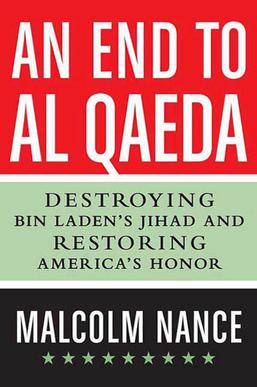
An End to al-Qaeda: Destroying Bin Laden's Jihad and Restoring America's Honor is a non-fiction book about counterterrorism strategies towards al-Qaeda, written by U.S. Navy retired cryptology analyst Malcolm Nance. The book describes how the September 11 attacks changed the traditional Muslim community around the globe. Nance criticizes the approach of the George W. Bush administration, including the verbiage and public presentations used in the War on Terror. The author argues al-Qaeda is not part of Islam but is instead a dangerous religious cult. Nance writes the United States should commit to better education with a public relations campaign to encourage traditional believers in Islam around the world to denounce al-Qaeda.
During the Iraq War, occupying U.S. forces set up camps and converted existing prisons in Iraq to detain POWs, suspected terrorists, and insurgents who were opposed to the American occupation. While reports vary, from 2003 onwards U.S. troops stationed in Iraq detained more than 100,000 prisoners in the American-held detention complexes. Many of these detainments were later determined to be unlawful, and the treatment of the prisoners, inhumane. While the most prominent case of unlawful imprisonment, torture, and prisoner abuse occurred at Abu Ghraib prison, several other detainment centers were revealed to have operated in a similar fashion, most notably at Camp Bucca and Camp Cropper.














